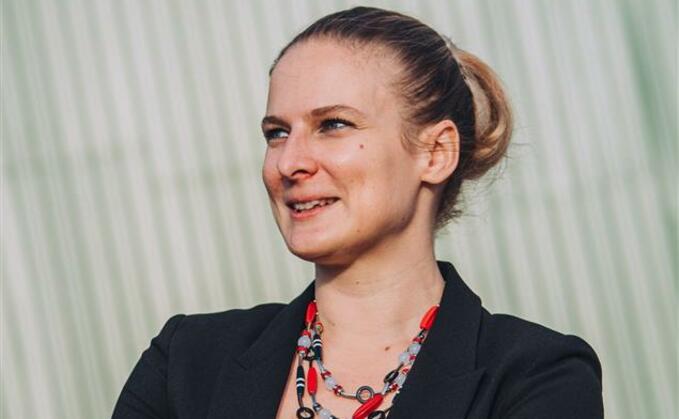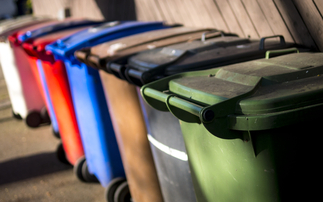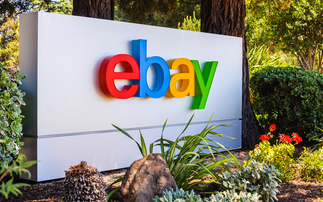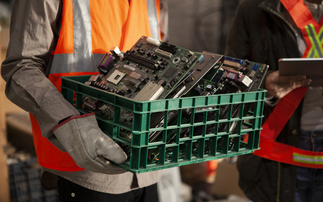
Credit: Viridor
Edita Adamcikova, ESG director at Viridor, the UK's largest operator of energy from waste facilities, unpacks the business, political, and societal complexities of building a net zero strategy ahead of the 2025 UK Green Business Awards
Edita Adamcikova is ESG director at Viridor Energy, which in May 2021 committed to achieving net zero by 2040, before becoming the UK's first climate positive waste management company by 2045. In her role, she is responsible for the design, implementation and delivery of Viridor's corporate environmental, social and governance (ESG) strategy, and is also a director of the Carbon Capture and Storage Association.
Viridor owns and operates essential infrastructure across the UK, with a fleet of twelve energy from waste facilities nationwide. These facilities operate 24/7 to provide heat and electricity to the network – powering the equivalent of 800,000 British homes. In addition, Viridor invests in new technologies to help realise a circular economy through its Quantafuel Plastics-to-Liquids project. Its operational facility in Skive, Denmark, transforms hard to recycle plastic films into oils, which can be used for new plastics production.
BusinessGreen: What was your first role in the green economy and what attracted you to the sector?
Edita Adamcikova: My first role in the green economy was working in energy performance, helping businesses minimise their energy use and deliver both reduced cost and emissions. Just as with ESG, you need to know what you have. What is my baseline? Understanding where a business is, then devising a routemap to improve and, critically, getting the leadership and the business as a whole on board with that journey. This combination of problem solving, behavioural psychology and making a difference for the environment and for the business - all while helping people have a purpose about what they do - is what drove me then, and still drives me to this day.
Viridor is sponsoring the Net Zero Strategy of the Year category at this year's awards - what do you think are the key elements of a successful net zero strategy?
Basing your net zero strategy on clear, science-based targets is fundamental to successful implementation - but, importantly, there must be a clear delivery roadmap. Organisational change of this scale must be led from the top, with clear capital allocation priorities and interim targets. A net zero strategy is complex, involving transformational change across the business, policy, and society, so demonstrating engagement with a broad set of stakeholders - and transparency of performance and plans - is important to drive the action that's needed to reach it.
Could you explain the core components of Viridor's own net zero strategy?
At Viridor, we are guided by our five-step decarbonisation plan. Our key actions are: reducing the carbon emissions of our operations - driving out plastics into recycling as plastics are the greatest source of our fossil carbon footprint and being a pioneer for new technologies such as carbon capture, which is the only way to fully abate emissions from treating unrecycled waste.
By deploying carbon capture, we can also capture and store naturally occurring (or biogenic) CO2, which will enable Viridor to become a climate positive business. Finally, we seek to deliver heat to local homes and businesses, which drives carbon reduction by displacing gas heating systems.
All of this is geared towards doing everything we can to support global decarbonisation goals, as well as the UK's pursuit of its legally binding goal of net zero by 2050. This ties into our Vision 2045 strategy, where we have committed to becoming the first UK net negative emissions waste company by 2045, having already reached net zero by 2040.
Can you shed some insight into the biggest challenges in creating and launching a net zero strategy?
Most people in business recognise that the changing climate is impacting their business, in particular through new policy to decarbonise the economy. The challenge, though, is to develop a credible and deliverable route to decarbonise which is aligned with the business and will maintain or enhance returns. We have been on a journey to understand what is needed and what can be delivered within our business. What emerged is that there is a deep interplay between investment and policy. This is especially the case with a sector such as waste where everything is driven by policy. Policy on recycling - especially plastics, interacts with policy on carbon pricing - which in turn impacts the design of carbon capture policy. The reality is that for major critical infrastructure sectors such as waste and recycling, we need to work closely with government to ensure policy aims and investment are aligned.
What parts of the green economy are you most excited about?
Our sector sits at the heart of the opportunity to build a truly circular economy - to fundamentally move our patterns of consumption, impact emissions as well as addressing wider resource use and the essential underlying challenge of humanity living within our planetary boundaries. For our sector, reduction of waste, novel ways to drive reuse, design for recycling and maximising recovery from what is truly non-recyclable is both complex and interconnected. Generating carbon dioxide removals from that is a thrilling challenge and one that I am delighted to be part of.
What developments do you think are currently under the radar?
We're doing incredible work at Viridor with our Quantafuel plastics-to-liquids project, which is proving itself to be a way to process hard-to-recycle plastics. Plastic films are incredibly useful in society and prevent a great deal of waste, especially food waste. They are, however, difficult to recycle and when treated in Energy from Waste emit nearly two tonnes of CO2 per tonne of plastic. With plastics to liquids technology, Viridor is innovating to deliver circularity in plastic film recycling.
What is the biggest misconception about the green economy?
There is a belief that the green economy means a worse economy or a lower-performing business. We have found that investing in developing our sustainability work has created a platform for growing the business and reducing our environmental footprint. In fact, examining ESG issues has helped the business get ahead of potential risks and policy change and shape those that enable our business to thrive. A good example would be Viridor's participation in the carbon capture programme, which the waste sector was excluded from before our engagement with government. That work came from understanding the climate risks facing the business.
What do you see as the biggest challenges to the net zero transition?
For me, it's ensuring we look past near-term 'noise' and sentiment on net zero and focus on keeping pace with the urgency of addressing the climate crisis. Given the scale of the ask and the timelines we are working towards to avoid the worst physical impacts of climate change, we need a long-term view, with long-term planning, significant investment and a supportive regulatory environment.
What advice would you give to someone looking to work in the green economy?
My advice would be to match your passion for addressing the climate crisis with a keen sense of delivery and understanding of the industry and economics. The sector needs people who are both purpose-driven and conscious of the financial and operational realities of pursuing energy transition. By blending these two attributes, you can play a powerful and effective role in progressing the green economy.
What can the green economy do to better promote its successes?
Doing good things, building teams and coalitions of people takes time and effort. Pulling down ideas and destroying things is fast and impactful. Working in the green economy is harder because you are building something. It can be challenging to work where much of the important progress we spearhead happens behind the scenes. This doesn't always translate into a compelling public narrative, so it's important we make clear how our efforts genuinely improve lives. Whether it is by protecting our planet, creating jobs or generating vital energy for the grid like we do at Viridor, we must challenge ourselves as a sector to explain better how our work delivers tangible benefits for society.
Edita Adamcikova is ESG director at Viridor. Viridor is the sponsor of the Net Zero Strategy of the Year award at the UK Green Business Awards 2025, which will take place on the evening of 11 June at The Brewery in London. You can reserve your place at the awards here.







